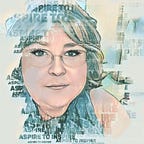Berlin Wall
Memoir
I stood in the late afternoon sun surrounded by blooms in the Ronald Reagan Presidential Foundation and Library. It is the home to astonishing exhibits. Including Reagan’s Air Force One airliner and a massive piece of the Berlin Wall that stands as a sentinel in the center of the rose garden. Covered in graffiti and moss, it is a symbol of the fall of the old Soviet Union.
I had fought against this barrier between the United States and the Soviet Union during the cold war. But, instead of bringing down the Berlin Wall, as President Reagan did, I had found a way to leap across it. Placing my hand on the warm stone of the monolith, I felt a sense of completion.
I had been a serious young woman, recently graduated from college, enjoying her first media industry position. I landed a job as the Unit Production Manager of a nationally syndicated radio news program on NPR. My main duties were being an assistant and liaison to the news editors and other departments of the parent production company.
One morning, I had finished writing the promo for our business news radio program, when the head of accounting walked up. She placed a file on my desk and gave me a stern look. I sensed her frustration, but felt that it was not directed at me, but more at the problem she was bringing to my doorstep.
